“Which English translation of The Brothers Karamazov should I read?”
So you want to read Fyodor Dostoevsky’s last novel, the first half of a planned two-part project, a deep dark tale inspired by personal tragedy that explores faith, philosophy, and morality, and you don’t read Russian.
First published as a complete novel in 1880 following serialization in 1879 and 1880, The Brothers Karamazov was first translated into English in 1912.
The Independent: “Patricidal passions in the abyss of nihilism” by Cathy Porter
“Thirty years after Dostoyevsky’s death in 1881 he was still largely unknown outside Russia when Arnold Bennett persuaded Heinemann to comission Constance Garnett’s translation of his final masterpiece, The Brothers Karamazov. It was received with raptures of love and loathing…. Several translators since Garnett have tackled this untranslatable mix of tragedy, metaphysics and comic melodrama…. Translators of Dostoyevsky face a monumental challenge to their sanity and endurance. We are outraged by the reek of corruption, the tearful humility, the deranged ecstasy, the carnivalesque scandal scenes, the lengthy disquisitions on saintliness and sin. We are unsettled by the illogicality, the doubts, reservations and conjectures, the shattering flashes of insight.”
TLDR?
If you just want a quick-and-dirty recommendation on which translation to choose, jump to the conclusion.
The Brothers Karamazov: translations in English
The original translation of The Brothers Karamazov by Constance Garnett has been revised and reissued several times. In addition to the Garnett translation, there have been seven other translations, five of which are still in print.
- 1912 – Constance Garnett (various publishers)
- 1949 – Constance Garnett revised/abridged by Alexandra Kropotkin
- 1958 – David Magarshack (Penguin)
- 1958 – Constance Garnett revised by Manuel Komroff (Signet)
- 1970 – Andrew R. MacAndrew (Bantam)
- 1976 – Constance Garnett revised by Ralph Matlaw (Norton)
- 1981 – Julius Katzer (Raduga)
- 1990 – Richard Pevear and Larissa Volokhonsky (Vintage, Everyman)
- 1993 – David McDuff (Penguin)
- 1994 – Ignat Avsey (Oxford)
- 2011 – Constance Garnett revised by Susan McReynolds Oddo (Norton)
- 2023 – Michael R. Katz (Liveright)
Seven of the twelve versions listed are in print.
The Brothers Karamazov: Why does the title have a strange word order?
As you may have guessed, the most common English title preserves the original word order of the Russian title, which is the normal word order in Russian (the only possible Russian word order, according to translator Ignat Avsey). Some translators, including Avsey, have switched the words around to sound more natural in English. However, it’s hard—and perhaps unwise—to change an old title after it’s become famous, as Penguin learned when, in 2013, it issued a new translation of Les Miserables by Christine Donougher as The Wretched. For better or for worse, I think we’re kind of stuck with Brothers Karamazov.
The Guardian: “Those famous brothers have the wrong name” by Stuart Jeffries
Should titles be translated literally or loosely? Opinions differ and tastes change with the times.
The Brothers Karamazov: Translation Comparison
Extracts have been included below so that you can see how the different translations sound.
The Brothers Karamazov: Other Info and Resources
For links to online guides and a few related books, jump down the page.
Stand-Alone Translations of “The Grand Inquisitor”
The novel contains a famous chapter-long prose poem called “The Grand Inquisitor”. The chapter has been published separately a number of times.
The translation by H.P. Blavatsky is available free online:
“How is the author’s name supposed to be spelled?”
Well, he was Russian, and Russians use the Cyrillic alphabet, not the Latin/Roman alphabet. The author’s name looks like this in Cyrillic:
![]()
There are multiple “English” transliterations:
- Fyodor Mikhailovich Dostoevsky
- Fyodor Mikhaylovich Dostoyevsky
- Fyódor Mikháylovich Dostoyévskiy
- etc.
Who was Constance Garnett?
She was a prolific translator of works from Russian into Edwardian English. Some consider her translations classic while others consider them outdated, but the importance of her role in bringing Russian classics to an English-language readership cannot be denied.
Among Garnett’s translations are Crime and Punishment, The Idiot, The Possessed (Demons), War and Peace, and Anna Karenina.
About the Garnett translation of The Brothers Karamazov
New York Review of Books: “A New Dostoevsky?” by John Bayley
“Her knowledge of Russian was not particularly good and she was apt to leave out the bits she could not quite get the sense of, but she adored her work and her style had a natural animation and flow…. [H]er version of Dostoevsky remained the standard one until fairly recently, though there were more accurate renderings by David Magarshak and others.”
The Open Mic: “Lost in Translation: Garnett v Pevear/Volokhonsky, Part 2” by E.S. Dempsey
This post contains two passages from two translations (plus the original Russian) for comparison.
Daily Kos: “The Brothers Karamazov Book Club”
This page contrasts passages by Garnett, McDuff, and P/V. “Garnett was the first and (in my opinion) her translation reads the most smoothly and 19th century, but she’s sometimes a bit inaccurate or elides over nuances…. For my money, Garnett is the best-written in itself but a little sloppy on the translating part…. [Y]ou might be able to find “updated” or “corrected” translations (like Ralph Matlaw’s version of the Garnett) that can mitigate some of the weaknesses.”
Lithub: “The Quiet Rebels of Russian Translation: In conversation with Larissa Volokhonsky and Richard Pevear”
“Until their translation of The Brothers Karamazov was published in 1990, the English-speaking world got its Dostoevsky (their preferred spelling—with one y) from the great British translator Constance Garnett. Though her translations of Turgenev and Chekhov are generally considered virtuosic, her versions of Dostoevsky, Gogol, and Tolstoy have drawn criticism for Victorian elision. Her Gogol translations are ‘dry and flat, and always unbearably demure,’ complained Nabokov. ‘The reason English-speaking readers can barely tell the difference between Tolstoy and Dostoevsky is that they aren’t reading the prose of either one,’ grumbled Joseph Brodsky. The critic Korney Chukovsky summed it up best and most brutally when he wrote, ‘Who does not feel the convulsions, the nervous trembling of Dostoevsky’s style? . . . But with Constance Garnett it becomes a safe bland script: not a volcano, but a smooth lawn mowed in the English manner—which is to say a complete distortion of the original.’ For her part, Garnett once wrote,’Dostoievsky is so obscure and so careless a writer that one can scarcely help clarifying him.’ ”
The Oxford Guide to Literature in English Translation edited by Peter France
Garnett’s is a flawed but generally accurate translation that reads smoothly but may sound old-fashioned now. Garnett’s translations “have been largely ousted from the popular market by their numerous competitors, but they still retain their value.” (page 596)
Extract from the Garnett translation of The Brothers Karamazov
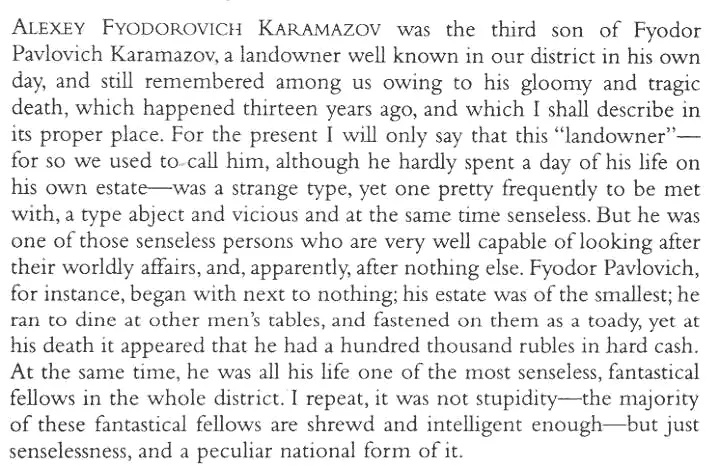
Audiobooks of the Garnett translation of The Brothers Karamazov
There are 8 different versions, including 3 free ones! See the listing at What’s the best audiobook of The Brothers Karamazov?
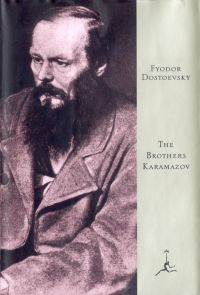
Get the Modern Library Garnett translation of The Brothers Karamazov
Includes an introduction by Constance Garnett
Available as an ebook (ISBN 9780307817013).
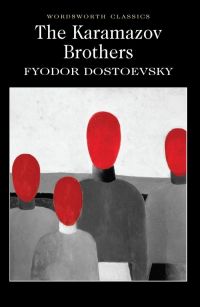
Get the Wordsworth Classics Garnett translation of The Brothers Karamazov
Includes an introduction by A.D.P. Briggs.
Available as a paperback (ISBN 9781840221862, 896 pages).
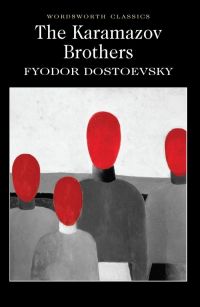
Get the Wordsworth Classics Garnett translation of The Brothers Karamazov
Includes an introduction by A.D.P. Briggs.
Available as an ebook (ISBN 9781848705715).
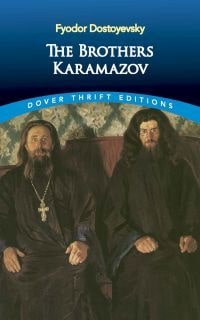
Get the Dover Garnett translation of The Brothers Karamazov
Available as a paperback (ISBN 9780486437910, 736 pages).

Get the Dover Garnett translation of The Brothers Karamazov
Available as an ebook (ISBN 9780486437910).
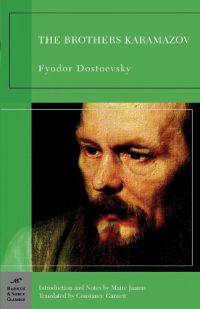
Get the Barnes & Noble Classics Garnett translation of The Brothers Karamazov
Includes an introduction and notes by Maire Jaanus, plus other informative extras (biography, chonology, study questions, bibliography, etc.).
Available as a paperback (ISBN 9781593080457, 752 pages).
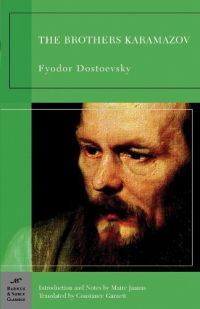
Get the Barnes & Noble Garnett translation of The Brothers Karamazov
Includes an introduction and notes by Maire Jaanus, plus other informative extras (biography, chonology, study questions, bibliography, etc.).
Available as an ebook (ISBN 9781411431867, 752 pages).
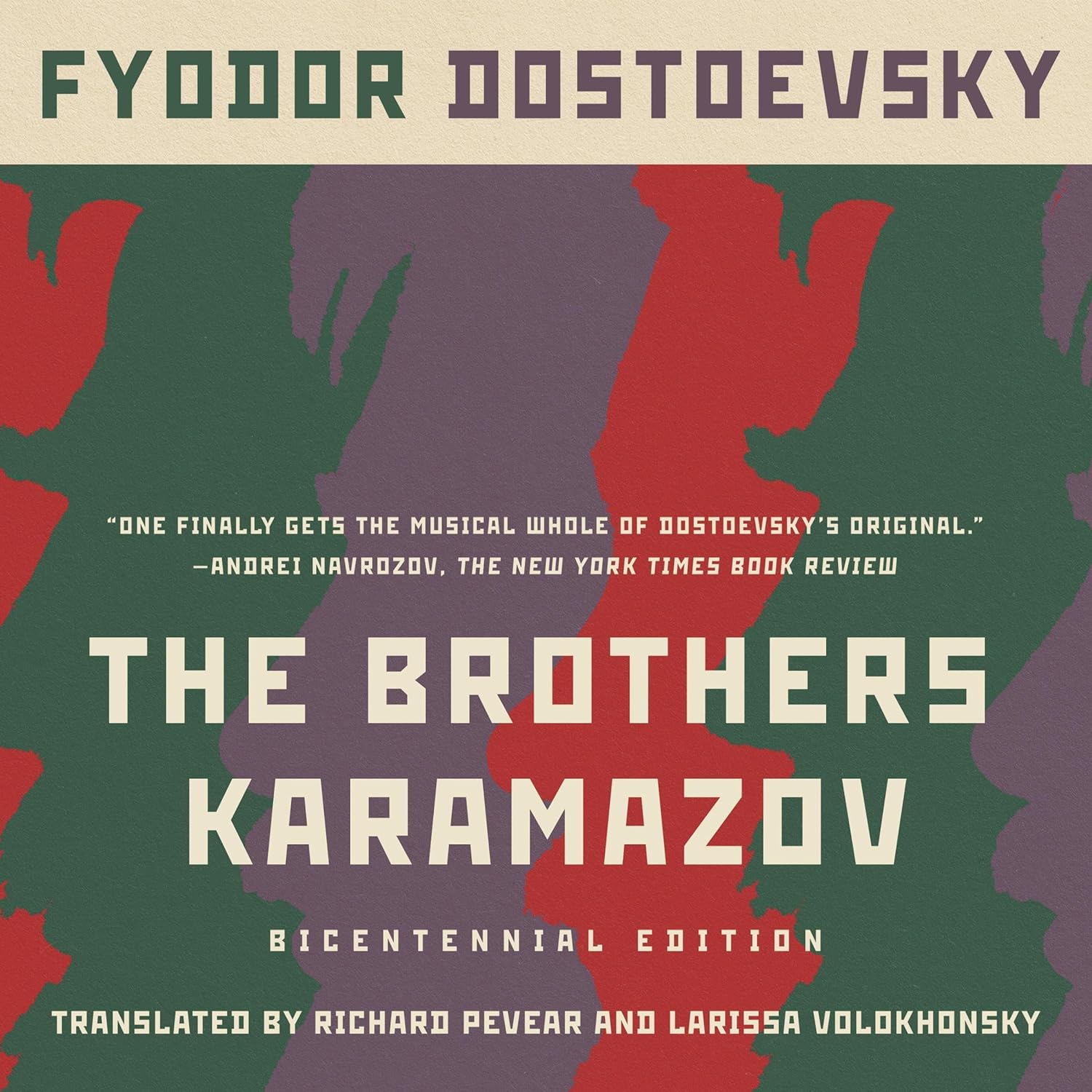
Get the Amazon Classics Garnett translation of The Brothers Karamazov
Available as an ebook.

Get the Standard Ebooks Garnett translation of The Brothers Karamazov
Free! Available in epub, Kindle, Kobo, and Advanced epub formats. Standard Ebooks are professionally edited, professionally designed versions of the Project Gutenberg texts.
Available as an ebook.
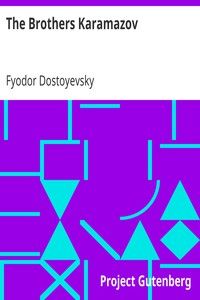
Get the Project Gutenberg Garnett translation of The Brothers Karamazov
Free! Available in html, epub, Kindle, and plain text formats.
Available as an ebook.
Who was Princess Alexandra “Sasha” Kropotkin?
She was a writer descended from the Russian Czar Rurik, born in exile in London, only child of the famous anarchist Peter Kropotkin, who renounced the title of Prince. She returned with her family to Russia in her 30s for a few years before settling in New York, where she built a career by writing about traditional women’s topics (cooking, etiquette, etc.).
About the Kropotkin translation of The Brothers Karamazov
To the best of my understanding, the Kropotkin translation is just Garnett’s translation with some parts changed and some parts left out.
She also produced an edited version of the Garnett translation of Crime and Punishment.
Worldcat lists an edition published by J.C. Winston in 1949 as “Fyodor Dostoevsky’s The Brothers Karamazov. Edited by W. Somerset Maugham in a translation revised by Princess Alexandra Kropotkin. Wood cuts by Louis Hechenbleikner. [Based on the translation of C.C. Garnett. Abridged.].” It is 483 pages.
Worldcat lists an edition published by International Collectors Library in 1949 as “The brothers Karamazov : abridged for modern reading”. Also 483 pages.
Worldcat lists an edition published by Literary Guild of America as “The Brothers Karamazov : Translation revised by Princess Alexandra Kropotkin. Illustrations by Georgette de Lattre.” It is also 483 pages. This version published in 1953.
Get the Kropotkin translation of The Brothers Karamazov
The Kropotkin editions are out of print, but you may be able to find a second-hand copy.
Who was David Magarshack?
A British writer born in what is now Riga, Latvia, he translated Crime and Punishment, The Devils aka Demons, The Idiot, other writings by Dostoevsky, and works by Chekov, Gogol, Goncharov, and Tolstoy. He wrote biographies of Russian authors.
About the Magarshack translation of The Brothers Karamazov
Russian names are anglicized in the text.
Bloggers Karamazov: “David Magarshack, the Penguin Archive, and Translating Dostoevsky: A Chat with Cathy McAteer”
“Magarshack approached his translation work with a keen sense that the ‘real’ Russia had never been accurately conveyed to British readers in preceding translations.” Regarding his techniques, she says: “[H]e tries his hand at vernacularized dialogue; incorporates Anglicized naming practices…; domesticates culture-specific references; avoids all footnotes [and] frequently tries to smooth out syntax.”
Lithub: “The Quiet Rebels of Russian Translation: In conversation with Larissa Volokhonsky and Richard Pevear” by Paris Review
Pevear: “I said, How is Magarshack going to translate this? And lo and behold, he didn’t. It wasn’t there. The jokes, or the unusualness, just disappeared…. The meaning is there, but the style, the tone, the humor are gone.”
New York Times: “Dostoyevsky, with All the Music” by Andrei Navrozov
“Magarshack, who translated The Brothers Karamazov in 1958, could be said to have effectively modernized Garnett’s prose.”
The Oxford Guide to Literature in English Translation edited by Peter France
Magarshack corrects some of Garnett’s errors and updates the language. However, his translations “lack some of the excitement of the foreign” and have not endured as well as Garnett’s. (page 596)
Extract from the Magarshack translation of The Brothers Karamazov
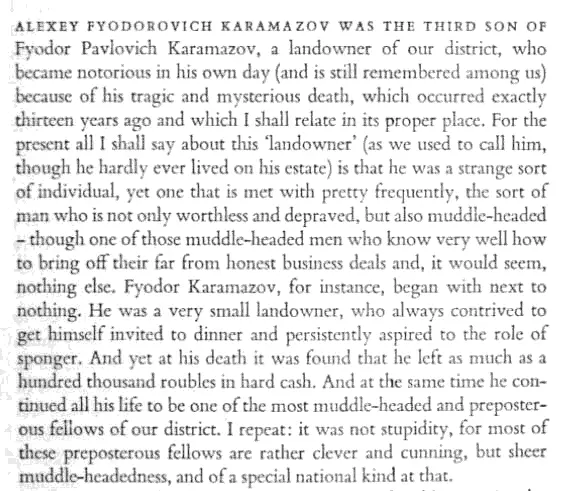
Get the Magarshack translation of The Brothers Karamazov
This translation, published in two volumes, is out of print. You may be able to find copies second-hand.
Audiobook of the Magarshack translation of The Brothers Karamazov
Still available. More information at What’s the best audiobook of The Brothers Karamazov?
Who was Manuel Komroff?
He was a prolific American journalist, editor, and author of non-fiction works, novels, plays, screenplays, and translations.
New York Times: Obituary of Manuel Komroff
“[W]hen the first Russian revolution took place he went to Petrograd and became the editor in chief of The Russian Daily News, published in English. When the Communists took over, he went to Shanghai, where he worked on The China Press, before returning to this country.”
About the Garnett/Komroff translation of The Brothers Karamazov
To the best of my understanding, Komroff’s edition of The Brothers Karamazov is complete. (His edition of War and Peace is abridged, so I didn’t list it on my page about the translations of War and Peace.)
Extract from the Garnett/Komroff translation of The Brothers Karamazov
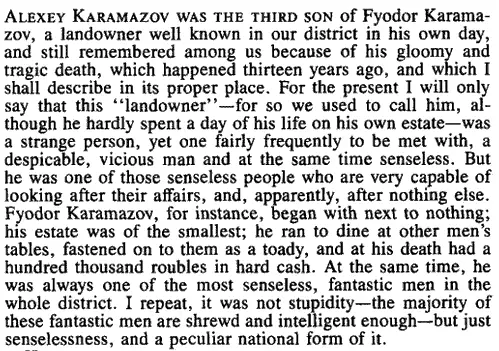
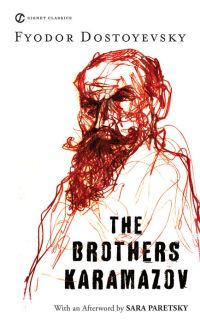
Get the Signet Classics Garnett/Komroff translation of The Brothers Karamazov
Edited and with a foreword by Manuel Komroff. Includes an afterword by Sara Paretsky.
Available as a mass-market paperback (ISBN 9780451530608, 928 pages).
Who was Andrew R. MacAndrew?
He was a professor at the University of Virginia and translator of plays and novels in Russian, including The Devils (Demons).
About the MacAndrew translation of The Brothers Karamazov
Russian names are anglicized in the text.
The Oxford Guide to Literature in English Translation edited by Peter France
This is an “unsatisfactory” translation that changes too much, rendering the text inauthentic.
Extract from the MacAndrew translation of The Brothers Karamazov
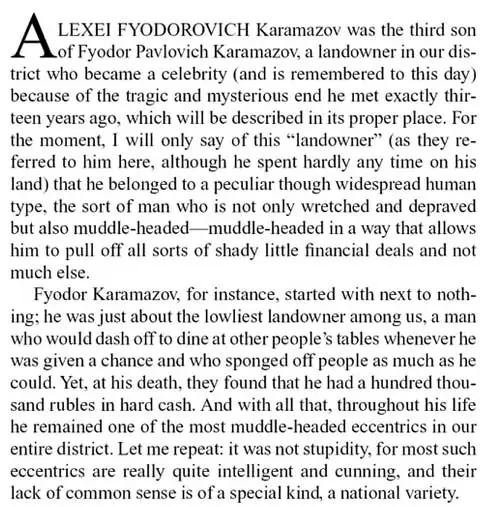
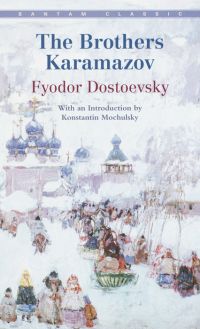
Get the Bantam Classics MacAndrew translation of The Brothers Karamazov
Includes an introduction by Konstantin Mochulsky.
Available as a paperback (ISBN 9780553212167, 1072 pages).
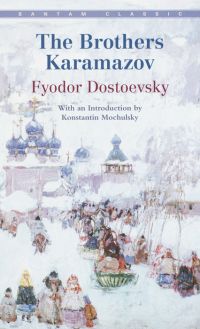
Get the Bantam Classics MacAndrew translation of The Brothers Karamazov
Includes an introduction by Konstantin Mochulsky.
Available as an ebook (ISBN 9780307755254).
Who was Ralph Matlaw?
He was a professor at Harvard, Princeton, and the University of Chicago and the editor or translator of works in Russian.
» New York Times: Obituary of Ralph Matlaw
About the Garnett/Matlaw translation of The Brothers Karamazov
The first Norton Critical Edition of The Brothers Karamazov was published in 1976. It is an edited version of the Constance Garnett translation. It includes backgrounds and sources, essays and criticism.
Get the Matlaw translation of The Brothers Karamazov
This edition is out of print. You may be able to find a second-hand copy.
Who is Julius Katzer?
I can’t find anything about him online.
About the Katzer translation of The Brothers Karamazov
It was published by Raduga/Progress Publishers, a Soviet-era publishing house, in Moscow in 1980 and 1990.
Get the Katzer translation of The Brothers Karamazov
These editions are out of print, but you may be able to find a second-hand copy.
Who are Richard Pevear and Larissa Volokhonsky?
They are a fabulously successful husband-and-wife translation team. They’ve also translated War and Peace, Crime and Punishment, The Idiot, Demons, The Master and Margarita, and works by Gogol, Pasternak, Pushkin, Chekov, and Turgenev, but they struck gold with Anna Karenina: Oprah chose their edition for her book club.
Some critics praise the authenticity and accuracy of their work, while others find it rough and unappealing; much ink has been spilled in the debate.
The Brothers Karamazov is the first work they translated together. They had a hard time finding a publisher to sponsor the project, but eventually got an offer from North Point Press and a grant from the National Endowment for the Humanities. Separately, Pevear has also translated works in French, Italian, Spanish, and Greek, including The Three Musketeers.
About the Pevear and Volokhonsky translation of The Brothers Karamazov
New York Review of Books: “A New Dostoevsky?” by John Bayley
“[Pevear and Volokhonsky] have a clear idea of what the problems of Englishing Dostoevsky are: how to give some idea of the extraordinarily rich polyphony of voices, accents, undertones, and suggestions in the text; how to convey the novel’s marvelous construction, and at the same time its wholly “living” air of majestic dishevelment. They have succeeded amazingly well…. it may well be that Dostoevsky’s [domain], with all its resourceful energies of life and language, is only now—and through the medium of new translation—beginning to come home to the English-speaking reader.”
Independent: “Patricidal passions in the abyss of nihilism” by Cathy Porter
“Pevear and Volokhonsky’s playful engagement with the characters’ language respects Dostoyevsky’s solecisms and inconsistencies and ‘as it weres’, and the result is earthy, colloquial and occasionally wordy.”
The Baltimore Sun: “Karamazov: Finding What Was Lost in Translation” by Anne Tyler
“This new translation has the same effect as rinsing a cloudy windowpane. All at once an amusing young girl seems out-and-out funny, a mildly satiric scene with a self-absorbed matron makes us laugh aloud, and those complex, tortured Karamazov brothers become people we might bump into in downtown Baltimore.”
Cana Academy: “You Should Read This II: The Brothers Karamazov” by Helen Decelles-Zwerneman
“Pevear and Volokhonsky created more a transliteration from the original Russian than a translation. As a result, the text has a less Anglicized, less poetic, perhaps more realistic tone to it. Some passages lose the lyrical quality found so strikingly in Garnett. Still, overall, Pevear and Volokhonsky’s realism has the effect of making the text uniquely powerful…. [I]f you are already familiar with The Brothers Karamazov, take a stab at Pevear/Volokhonsky.”
The Open Mic: “Literary Translation: How to Get Rich and Famous” by E.S. Dempsey
“Richard Pevear and Larissa Volokhonsky have tried to restore, to recapture, some of the original Russian rhythm and nuance. They were not trying to make it simple, they were making it more ‘real.’”
The Open Mic: “Lost in Translation: Garnett v Pevear/Volokhonsky, Part 2” by E.S. Dempsey
This post contains two passages from two translations (plus the original Russian) for comparison.
Daily Kos: “The Brothers Karamazov Book Club”
This page contrasts passages by Garnett, McDuff, and P/V. The “award-festooned” P/V translation “reads a bit clunky” and “their word choices are sometimes the most jarring”.
Humanities: “Done with Tolstoy” by Kevin Mahnken
” ‘Constance Garnett didn’t understand that [Dostoevsky] was funny. And every time he was funny—which he very often is, even at the most heartbreaking moment—she removed it,’ Richard [Pevear] claims. ‘The humor transforms the darkness of what he’s describing. And so that all got omitted for a long time. We wanted to restore that; that was our first mission.'”
John Pistelli: “In Defense of Pevear and Volokhonsky”
“I see P&V’s calculated evasion of Victorian English as eminently appropriate. Without P&V, I doubt I would have sweated with Levin at the reaping or walked dizzily through the city with Raskolnikov during my college years’ long hot summers of extra-curricular reading, some of the best and most intense reading experiences of my life.”
Lithub: “The Quiet Rebels of Russian Translation: In conversation with Larissa Volokhonsky and Richard Pevear” by Paris Review
“Pevear and Volokhonsky’s translations have been lauded for restoring the idiosyncrasies of the originals—the page-long sentences and repetitions of Tolstoy, the cacophonous competing voices of Dostoevsky. Though almost unanimously praised by reviewers and Slavic scholars, they have a few critics who accuse them, in fierce blog posts, of being too literal or prone to unidiomatic turns of phrase. Pevear, who is sometimes drawn into the online jousting, never apologizes for erring on the side of the unfamiliar sounding over muting the original.”
First Things: “The Pevear/Volokhonsky Hype Machine and How It Could Have Been Stopped or At Least Slowed Down” by Helen Andrews
This is an interesting article that explains the backlash against Pevear and Volokhonsky. The article claims that the P&V translation is not particularly good, that the translators were simply the beneficiaries of the tendency of the literary world not to criticize new translations.
New York Times: “Dostoyevsky, with All the Music” by Andrei Navrozov
“It is in this new translation by Richard Pevear and Larissa Volokhonsky that one finally gets the musical whole of Dostoyevsky’s original.”
The Oxford Guide to Literature in English Translation edited by Peter France
“Pevear and Volokhonsky, while they too stress the need to exhume the real, rough-edged Dostoevsky from the normalization practised by earlier translators, generally offer a rather more satisfactory compromise between the literal and the readable. In particular, their rendering of dialogue is often livelier and more colloquial than McDuff’s.” Still: “[T]he desire to replicate the vocabulary or the syntax of the Russian results sometimes in unnecessary awkwardness and obscurity.”
Extract from the Pevear and Volokhonsky translation of The Brothers Karamazov
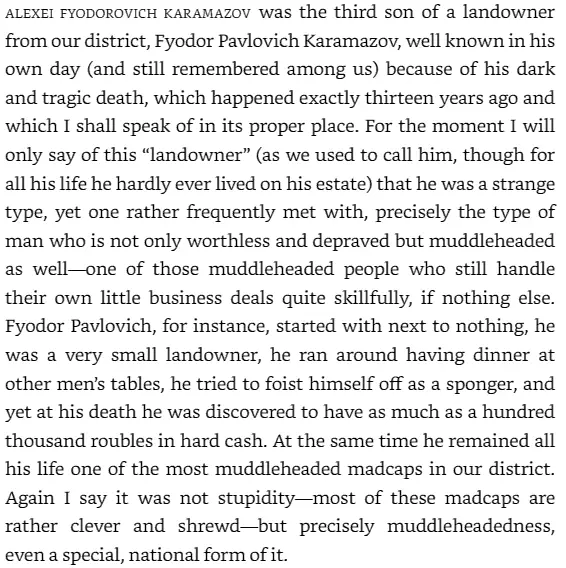
Audiobook of the Pevear and Volokhonsky translation of The Brothers Karamazov
There’s an abridged audiobook version. More information at What’s the best audiobook of The Brothers Karamazov?
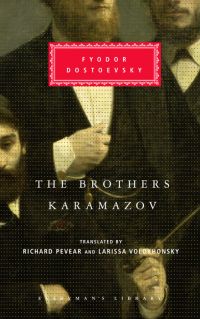
Get the Everyman's Library Pevear and Volokhonsky translation of The Brothers Karamazov
Includes an introduction by Malcolm Jones.
Available as a hardcover (ISBN 9780679410034, 840 pages).
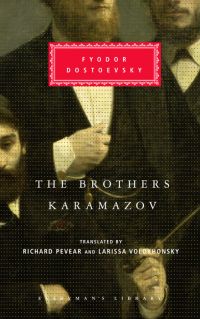
Get the Everyman's Library Pevear and Volokhonsky translation of The Brothers Karamazov
Available as a hardcover (ISBN 9781857150704, 796 pages).
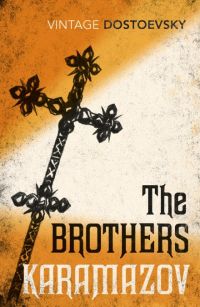
Get the Vintage Classics Pevear and Volokhonsky translation of The Brothers Karamazov
Available as a paperback (ISBN 9780099922803, 816 pages).
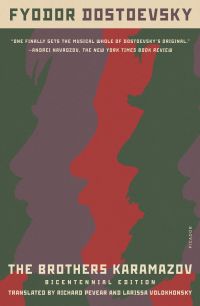
Get the Picador Pevear and Volokhonsky translation of The Brothers Karamazov
Bicentennial edition.
Available as an ebook (ISBN 9781429927215).
Who is David McDuff?
David McDuff is a British translator of Russian and Scandinavian poetry and prose, an editor and a literary critic. Penguin published his translations of Dostoevsky’s Crime and Punishment and The Idiot.
About the McDuff translation of The Brothers Karamazov
Independent: “Patricidal passions in the abyss of nihilism” by Cathy Porter
“The great strength of this new translation, despite its cerebral wordiness, is to look madness in the face. Only by surrendering to the horror can we engage with these Napoleons, murderers and femmes fatales of the St Petersburg slums, and see what makes Dostoyevsky’s world such a rich, dangerous and funny place.”
Daily Kos: “The Brothers Karamazov Book Club”
This page contrasts passages by Garnett, McDuff, and P/V. “McDuff is much more accurate but often reads a bit clunky…. McDuff’s commitment to accuracy means he provides extensive glosses instead of natural English paraphrases, which is why he’s the longest (by a good 25%!), and often unnecessarily so.”
The Oxford Guide to Literature in English Translation edited by Peter France
McDuff’s translation is the most literal (even more so than P&V). This means “the dialogue is sometimes impossibly odd—and as a result rather dead.”
Extract from the McDuff translation of The Brothers Karamazov
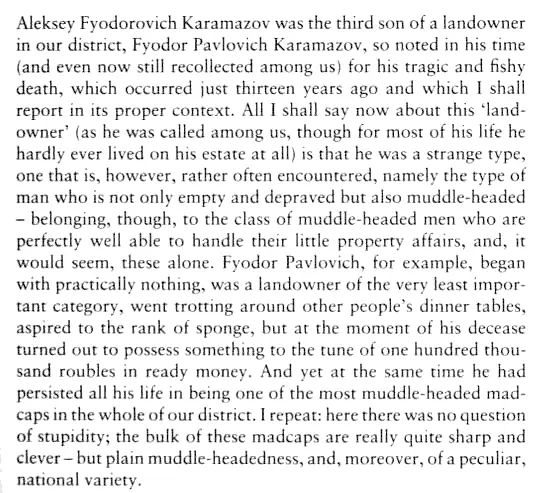
Audiobook of the McDuff translation of The Brothers Karamazov
Penguin offers an audiobook of this version. More information at What’s the best audiobook of The Brothers Karamazov?

Get the Penguin Classics McDuff translation of The Brothers Karamazov
Includes notes and introduction by David McDuff, chronology, further reading, and a note on the text.
Available as a paperback (ISBN 9780140449242, 960 pages).
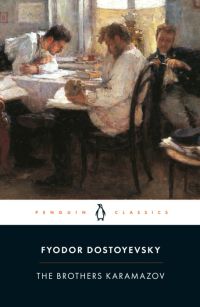
Get the Penguin McDuff translation of The Brothers Karamazov
Introduction and translated by David McDuff
Available as an ebook (ISBN 9780141915685, 1056 pages).
Who was Ignat Avsey?
He was a British translator, lecturer, and critic. In addition to The Brothers Karamazov, he also translated Dostoyevsky’s Village of Stepanchikovo, Humiliated and Insulted, and The Idiot.
The Guardian: Obituary of Ignat Avsey
“He believed profoundly in the translator’s role as a creative figure and leader of taste, and paid the price for this ideal in his unsuccessful lawsuit against the University of Westminster (settled out of court) for not crediting his translations as ‘original research’.”
About the Avsey translation of The Brothers Karamazov
Patrik Bergman: “Choosing the Best Karamazov Translation”
“There is something about the rhythm and choice of words that appeal to me, and that helps me understand the characters.”
Journal of European Studies: “Review of The Karamazov Brothers” by Diane Oenning Thompson
“Avsey has aimed ‘to be as faithful as possible to Dostoevsky’s style’ (p.xxix). However, the problems begin with his permutation of the title as The Karamazov Brothers…. Avsey’s translations of several book and chapter headings are unsatisfactory, imprecise and defective.”
Notes from an Idiot: “The Karamazov Brothers”
“Avsey’s translation feels much more contemporary than Magarshack’s, and I think for the modern reader his language delineates the characters a little more sharply, changing them from smudgy pencil sketches to crisp inked outlines…. [T]his probably gives us a better sense of how Dostoevsky’s Russian might have felt to his first readers – but then again, we don’t feel the need to re-write Dickens or Hardy just because their prose is rooted in the 19th century. I still find that Magarshack’s text is the more fluid (I can’t comment on which is more accurate), but Ignat Avsey’s is immensely enjoyable and I wholeheartedly recommend it to anyone.”
The Oxford Guide to Literature in English Translation edited by Peter France
His choice to change the traditional word order of the title reflects his desire to bring the text to readers in idiomatic English. “His is an enjoyable version in the domesticating tradition.” It is on the opposite end of the spectrum from the literal translations of McDuff and P&V.
Extract from the Avsey translation of The Brothers Karamazov
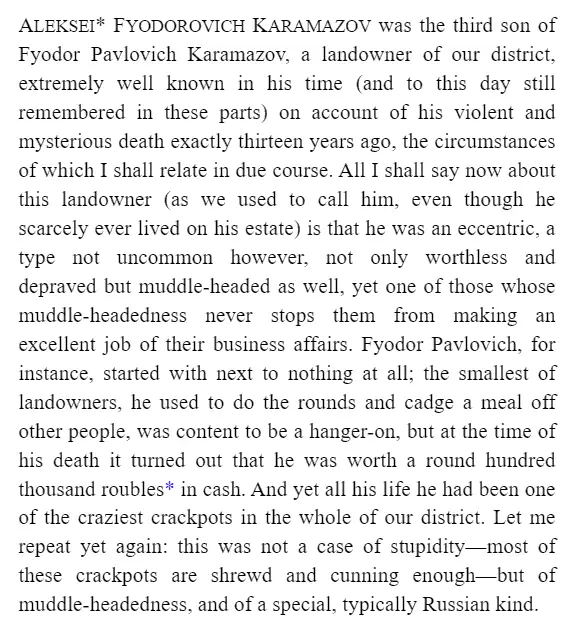
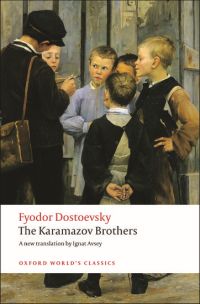
Get the Oxford World's Classics Avsey translation of The Karamazov Brothers
Includes an introduction and notes by Ignat Avsey, translator's note, texts used, bibliography, chronology, list of characters, and a time chart.
Available as a paperback (ISBN 9780199536375, 1054 pages).
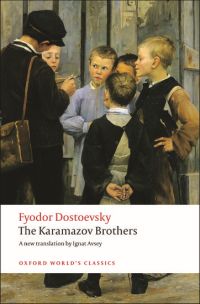
Get the Oxford World's Classics Avsey translation of The Karamazov Brothers
Includes an introduction and notes by Ignat Avsey, translator's note, texts used, bibliography, chronology, list of characters, and a time chart.
Available as an ebook (ISBN 9780191647802).
Who is Susan McReynolds Oddo?
She is a professor of Slavic languages and literature at Northwestern University. She has a BA from Stanford and a PhD from Harvard. She is the author of Redemption and the Merchant of God : Dostoevsky’s Economy of Salvation and Antisemitism.
About the Garnett/Matlaw/Oddo translation of The Brothers Karamazov
This is the Second Norton Critical Edition, first published in 2011. It is an updated version of the Norton Critical Edition edited by Ralph Matlaw.
Earlier book covers for the Second edition had a brown, framed design; the current printings have the same cover image, but the design features a purple band across the bottom.
From Norton:
The text is accompanied by a detailed introduction, a pronunciation and explanation key for the novel’s main characters, and greatly revised and expanded explanatory annotations.
“Contexts” presents a wealth of background and source materials relating to The Brothers Karamazov, to Dostoevsky’s own experiences, to current events, and to observations on a changing society. Included are the correspondence of influential literary and social critic Vissarion Grigorievich Belinksy and the author’s letters spanning three decades as well as a selection from Dostoevsky’s Diary of a Writer in which readers may trace the origins of this novel.
“Criticism” offers a wide range of scholarly commentary on The Brothers Karamazov from American, Russian, and European authors, eleven of them new to the Second Edition and two of them appearing in English for the first time. Contributors include Ralph Matlaw, Valentina Vetlovskaia, Seamas O’Driscoll, William Mills Todd, Vladimir Kantor, Edward Wasiolek, Nathan Rosen, Roger B. Anderson, Robin Feuer Miller, Horst-Jürgen Gerigk, Vladimir Golstein, Robert L. Belknap, Ulrich Schmid, and Gary Saul Morson.
A Chronology of Dostoevsky’s life and work and a Selected Bibliography are also included.
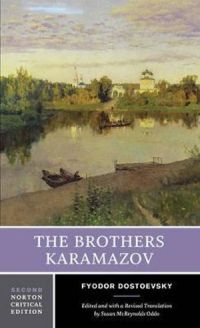
Get the Norton Garnett/Matlaw/Oddo translation of The Brothers Karamazov
Second edition, published in 2011. Based on a significantly revised translation by Susan McReynolds. Includes an introduction, a pronunciation key and family tree for the characters, explanatory notes, letters and excerpts for context, 14 criticical essays, a chronology, and a selected bibliography.
Available as a paperback (ISBN 9780393926330, 811 pages).
Who is Michael R. Katz?
Michael Katz is an Emeritus Professor of Russian and East European Studies and the translator of over a dozen Russian novels, including Dostoevsky’s Crime and Punishment and Devils.
About the Katz translation of The Brothers Karamazov
Lithub: “The Unique Challenges of Translating The Brothers Karamazov Into English” by Michael R. Katz
“I chose not to follow the translations of my predecessors; however, on occasion I did engage with them critically, especially in the particularly complex passages, believing that literary translation is in reality an enterprise in which a translator builds on the work of his/her predecessors. If Garnett could come up with the perfect English counterpart, who was I to reject it and use a less appropriate phrase? In my translations, I try to achieve an evenhanded position on the continuum of accuracy/accessibility, somewhat closer to my readers—namely, the general public and students in high schools and colleges. What elements have I tried to highlight in my own version of Dostoevsky’s masterpiece? First of all, I try to do justice to the author’s dark sense of humor…. Secondly, I tried to be mindful of this rich high-style source [Old Russian] and render it with my own elevated language. Finally…. I eliminated what I considered unnecessary repetition of words [while retaining] essential repetitions, those that have semantic importance…. I hope to have produced a version of The Brothers Karamazov that will engage the general public and students for some time to come.”
New Yorker: “The Cacophonous Miracle of The Brothers Karamazov” by Jennifer Wilson
The new translation by Katz is “lively, fast-flowing.” “The novel has a spoken quality that is meant to communicate the unreliability of memory and the fact that people tend to misunderstand one another far more often than they do the opposite. Katz is particularly attentive to this feature of Dostoyevsky’s prose. His is, by my estimation, the voiciest translation of the novel thus far. He writes at the fever pitch of speech, unleashing the speed and the chaos of the original.”
Wall Street Journal: “Review of The Brothers Karamazov” by Sam Sacks
The Katz translation uses versions of the word ‘ecstasy’ twice as many times as the Garnett translation. “Garnett’s brilliance was bound up in the fluency of her prose, and she was prone to taking Dostoyevsky in hand when he became too crazed or inscrutable, fixing repetitions, cutting apparent non sequiturs and breaking up massive paragraphs into shorter, more readable portions. Mr. Katz has accepted ungainliness in return for greater intensity. His translation sharpens the sensation unique to Dostoyevsky, that of a man clutching your forearm and shouting something into your face.”
Washington Post: “The Brothers Karamazov is a classic, but it’s not beyond criticism” by Michael Dirda
“Not knowing Russian, I simply made some spot comparisons among these three texts, and the differences struck me as minor. While I certainly enjoyed rereading ‘The Brothers Karamazov’ in this well-designed Liveright edition, I suspect that almost any modern translation will convey the deeply felt humanity, as well as the majesty, of Dostoevsky’s final masterpiece.”
Lapham’s Quarterly: “One Can Scacely Help Clarifying Him” by Michael R. Katz
Garnett’s translation “has endured and been a frequent choice of readers for over one hundred years…. One result of her ‘clarifications’ was the elimination of the narrator’s various mutterings and prevarications, which combine to lend an air of rumor and unspecified intrigue to the narrative and thereby enhance the plot. The other most popular version of the novel is by the American-Russian team of Richard Pevear and Larissa Volokhonsky, published over twenty years ago, the first of their long series of translations of the Russian classics. Their translation is characterized by a too close adherence to the Russian text that results in a word-for-word and syntax-for-syntax style that sacrifices tone and frequently misconstrues a passage’s overall sense. Critics have noted that previous translations are often lacking in the specificity of individual speech. They seem to use one common level of English diction and syntax…. Each character speaks in his or her own Russian idiolect. It is the translator’s job to try to capture their individual speech patterns.”
Shepherd Express: “The Brothers Karamazov by Fyodor Dostoevsky, translated by Michael R. Katz” by David Luhrssen
“Dostoevsky’s irony is more noticeable than in previous English language versions, which tended to muffle the humor. Katz’s rendering in plain, contemporary English sets the Russian author’s satire in high relief.”
Miller’s Book Review: “Worth Every Ruble: Katz’s Brothers Karamazov” by John Stamps
“Katz transforms the novel into a legal thriller worthy of John Grisham. You think I jest? I do not. It crackles and zings. Every paragraph is impassioned, fiery, and intense. Characters jump from the page. I couldn’t wait for the next weird thing that was going to happen to these fascinating all-too-human characters…. Simplifying the naming of characters is a brilliant decision. The story of this glorious cast of malcontents, oddballs, eccentrics, nutcases, buffoons, and cranks (perfect raw materials for saints-in-the-making) never once loses its brisk pace…. Katz’s translation makes my pulse race. In his hands, the nonstop dialogue is both gripping and easy to follow…. Katz offers truly helpful footnotes…. He doesn’t just give us a ripsnorter of a crime thriller. Katz’s lean prose gives the reader the necessary mental space to stop and think, undistracted by pretentious overtranslation.”
From the translator’s introduction:
“This new translation attempts to reveal the soul of his masterpiece, striking a balance between accuracy and accessibility, making the work available to the general reader in a way that strives to do justice to the unique qualities of the original…. This new translation tries to do justice to Dostoevsky’s dark and subtle sense of humor…. This new translation also attempts to render the rhetorical eloquence of the most poignant and significant passages, those in which Dostoevsky’s characters express their deepest religious convictions.”
Extract from the Katz translation of The Brothers Karamazov
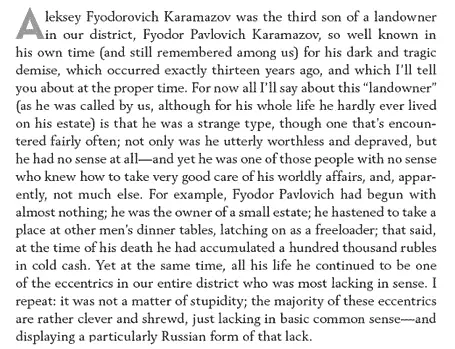
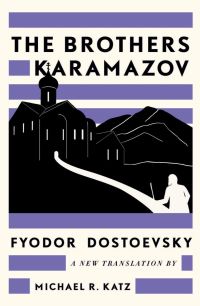
Get the Liveright Katz translation of The Brothers Karamazov
Includes an introduction, afterword, and acknowledgments by the translator.
Available as a hardcover (ISBN 9781631498190, 928 pages).
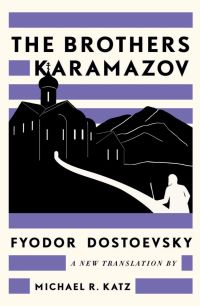
Get the Liveright Katz translation of The Brothers Karamazov
Includes an introduction, afterword, and acknowledgments by the translator.
Available as an ebook.
Audiobooks of The Brothers Karamazov
There are unabridged audio versions of the Garnett, Magarshack, and McDuff translations, as well as some abridged versions and retellings. More information at:
» What’s the best audiobook of The Brothers Karamazov?
Study notes for The Brothers Karamazov
The Brothers Karamazov is a challenging book! If you want to not only read it but read about it, try:
» Sparknotes for Brothers Karamazov
» Cliffs Notes for Brothers Karamazov
» Shmoop for Brothers Karamazov
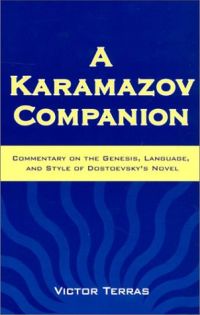
Get A Karamazov Companion by Victor Terras
"Victor Terras's companion work provides readers with a richer understanding of the Dostoevsky novel as the expression of a philosophy and a work of art."
Available as a paperback (ISBN 9780299083144).
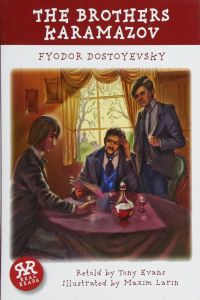
Get The Brothers Karamazov by Tony Evans (Adapter), Maxim Larin (Illustrator)
Illustrated children's retelling.
Available as Paperback. Also available as an ebook and as an audiobook. (ISBN 9781911091059, 64 pages).
What’s the best Brothers Karamazov translation?
The two most popular and well-known translations seem to be Garnett and Pevear & Volokhonsky.
If you want a readable but foreign and period-sounding text, get one of the Garnett editions.
- If you like free ebooks, download a public-domain copy of the original Garnett translation.
- If you want a compact book, get the Garnett/Komroff paperback from Signet.
- If you want a lot of extra background information, get the Norton Critical Edition.
If you are familiar with the novel already, or you’re up for a challenge, try Pevear and Volokhonsky for a more authentically Russian reading experience.
If the idea of reading an old-fashioned or jarringly Russian text is intimidating, try Avsey, a looser translation written in idiomatic modern English, or the newest translation by Katz.
Already have a favorite translation of The Brothers Karamazov? Let us know which one and why in the comments!
More Dostoevsky
Other Novels by Fyodor Dostoevsky
- The Village of Stepanchikovo (aka The Friend of the Family)
- Humiliated and Insulted (aka The Insulted and Humiliated, The Insulted and the Injured, Injury and Insult)
- The House of the Dead (aka Notes from a Dead House, etc.)
- Notes from Underground
- Crime and Punishment
- The Idiot
- Demons (aka The Possessed, The Devils)
- The Adolescent (aka A Raw Youth, An Accidental Family)
Novellas by Fyodor Dostoevsky
- Poor Folk
- The Double
- The Landlady
- Uncle’s Dream
- The Gambler
- The Eternal Husband

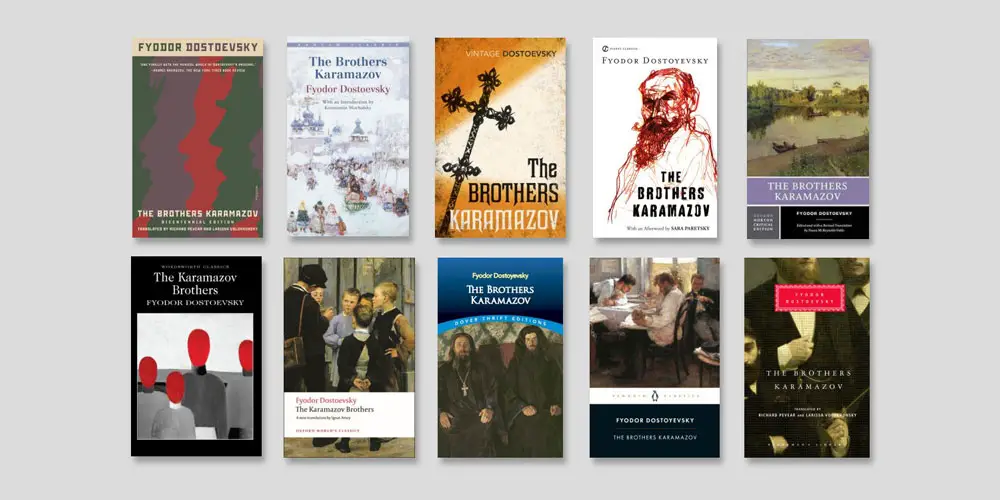

I was re-reading Garnett’s translation when I came to the scene where the schoolboys are throwing stones and taunting another schoolboy by calling him “wisp-of-tow”. I became frustrated that this phrase meant nothing at all to me, so I researched other versions. Avsey rendered the phrase as “loofah” and immediately I had a clear picture in my head of what the taunting was all about. I switched to Avsey and have been very pleased.
Parenthetically, I come from a family of 5 brothers, and in my hometown we are known as “The Huff brothers”, not “the Brothers Huff”. I find the title to be a refreshing rephrasing.
Thanks for the very helpful article. What do you think of the prospects for the Michael Katz translation of BK coming this July ’23 from W. W. Norton? Will it eventually become the Third Edition of the NCE of BK replacing the 2011 Garnett/Matlaw/Odoo second edition or remain separate? My first reading of BK will be the 2nd NCE.
Hi David, thanks for the positive feedback, and for bringing the new Katz translation to my attention. I imagine the Katz translation of Brothers Karamazov will do well, because the Katz translation of Crime and Punishment seems to have done well. I don’t know if Norton has plans to issue the Katz translation as a Norton Critical Edition and stop producing the Garnett translation… there would be advantages to selling the Katz translation under two product lines (Liveright and NCE) as they do for C&P, but there would also be advantages to selling two different translations. If I had to guess, I’d say they’ll switch to Katz because their Garnett edition has to compete with all the other Garnett editions out there.
On the first page, Katz says that R is subletting the attic room. The term “sublet” seems so foreign that I can’t get past it. It sounds like, I don’t know, that he’s living New York now in a sublet. No, if he Americanizes terms like sublet, I couldn’t imagine his doing justice to the rest of my novel. For me, Magarshack is the one I read.
Hm. To me, ‘sublet’ sounds not foreign but definitely modern. I just checked, though, and the Google Books Ngram Viewer indicates it’s actually a much less popular word now than it was in 1916, and about as popular now as it was in the 1860s, when the novel was set. I don’t know how popular the word was in different parts of the world, though.
Hi,
This was a very informative article. I am conflicted between McDuff and Avsey. Both seem readable to me. What would you suggest?
For context: It is my first read of anything Russian, and I preferred Lydia Davis over Moncreiff when I started Proust (the only other work I spent time on worrying about translations)
Thanks
Hi Shivam, thanks for your feedback!
McDuff’s is longer, so maybe you could decide based on your reading style—whether you want to patiently immerse yourself in the writing or read just to get an idea of the story. If you’re reading Proust then I think you don’t have a problem with big time commitments! So maybe try McDuff. Either way, enjoy!
Thanks a lot McDuff it shall be!!
Thank you for organizing this compendium. I would like to use this as my next option for our book club.
I typically enjoy reading an ebook version along with an audio version. Can you give me a suggestion so the two versions are in synchrony (the same)?
Hi George! There are unabridged audiobook versions of the Garnett translation, the Magarshack translation, and the McDuff translation. Since the Magarshack text is out of print, I would suggest choosing Garnett or McDuff. Garnett is in the public domain, so copies of the text and also the audiobook are available free. The McDuff book and audiobook are available from Penguin.
If you use Kindle ebooks, you can take advantage of Amazon’s Whispersync feature, which allows you to easily keep your place in corresponding Kindle and Audible books.
» AmazonClassics Garnett Kindle
» AmazonClassics Garnett Audible
» Penguin McDuff Kindle
» Penguin McDuff Audible
If you want to have a look at all the audiobook choices, check out this page:
» What’s the best audiobook of The Brothers Karamazov?
Whichever version you choose, I hope you and your book club enjoy the novel!
Got them both (Garnett).
Tx
The David Mcduff translation is by far the best.
Thanks for sharing your opinion, I can tell you feel strongly about this! Can you share what it is that you really like about the Mcduff version, or how it strikes you as being so much better than one or more of the other ones?
Thanks for your effort in writing this! You’ve gathered all the information one needs to make an informed decision when selecting a translation. Your formatting, hyperlinking, & execution are impeccable! Please continue writing content like this for the great works!
I’ve read both the Constance Garnet & the Pevear & Volokhonsky translations in their entirety. Now I’m picking Brothers K up for a 3rd time. I’m choosing the McDuff translation to get as close to the source as I can.
My advice to the novice reader – Don’t choose the Pevear & Volohonsky translation. Their writing style may capture the Russian tone, but it’s at the expense of making the characters & dialogue feel unrelatable to Anglophonic natives. The translator’s wild, energetic & over-the-top tone of voice was jarring to my sense of manners, politeness & decorum. When reading Pevear & Volohonsky’s translations of both Tolstoy & Dostoevsky, I felt that most of the characters were mentally unhinged. Only when I read the Garnett version did I realize that impression was the product of the translation. (Some of the characters are still unhinged, but their afflictions are relatable).
Lucy,
I want to get a copy for my Chinese girlfriend. What translation do you recommend for a non-native English speaker who is unfamiliar with Victorian writing?
Hi Daniel, Thanks for your kind words of appreciation and encouragement, and for your advice to novice readers.
I think for a non-native speaker, maybe the Avsey translation would be best, as it is characterized as being in contemporary, idiomatic English. Avsey’s choices seem motivated by a desire for good accessibility.
Very interesting. This is my first time reading BK and english in not my first language (all though 50% of what I read is in english) and I’m finding the P&V translation to be very fluid and natural. I’ve ordered the Ignat translation to compare whenever I feel lime reading the book a second time. I guess the fact that English is not my native language has something to do with me finding the P&V translation really fluid and enjoyable. Can’t wait to compare to other translations, but as we say in Mexico “para gustos, colores”.
Hi, Thanks for much for uploading this information. It’s been very helpful.
I’m considering ordering the Garnett translation published by Signet Classics. Can anybody confirm if it has actually been revised by Manuel Komroff? When I looked at the Amazon description, it merely stated there was a forward by Komroff. Does anybody have this version to confirm whether the translation has actually been revised? Thanks in advance.
Hi Ryokan,
The publisher description on some retail pages (for example, the Book Depository page for the Signet edition) says “Edited and with a Foreword by Manuel Komroff”.
The title page of the Signet edition says “Edited and with a Foreword by Manuel Komroff”.
The copyright page of the Signet edition says “For the many days and nights of work and for many important suggestions in preparing this new edition for the American reader, the editor here acknowlegdes with gratitude the invaluable assistance of his wife, Odette Komroff.” Also, the copyright is under Komroff’s name, which means he had to have changed the text substantially.
Above, I’ve added an image of the first paragraph from the Signet edition. It’s clear from comparing this extract to the Garnett extract that the text has been edited. The wording is exactly like the Garnett translation for almost the entire first sentence (“owing to” changed to “because of”); the other sentences also follow Garnett closely but not exactly. Every sentence has some different words substituted in.
Let me know if you want a slightly longer extract!
–LDW
Hi,
Just popping my head in to say how much I appreciate this page and the time you’ve taken to write it. I was about to do all this research myself, but thankfully stumbled upon this site and it is exactly what I needed. (I’m still a bit on the fence about which Karamazov translation to pick, but I’m now well on my way!)
Cheers!
Hi Linus, Thanks for taking the time to leave feedback about the site! When you’ve chosen a translation, come back and let us know which one you chose and why. = )
Hello again,
After quite some consideration, I picked the Garnett version.
Garnett has, apparently, been criticized for skipping some paragraphs and writing in a style very typical of Victorian England. I was worried about this at first, but then remembered that Dostoyevsky’s style – which, to some degree, was conspicuous in all the various Dostoevsky translations I’ve read previously – is, in my opinion, one of his weaknesses. At his best, the plot, characters and philosophy are all wonderful, but I’ve often found the prose a bit repetitive, not very beautiful and somewhat (forgive me!) adolescent in tone – which is quite jarring when the psychology is as insightful as it is.
So, if Garnett has shortened the sentences and written in a formal, complex-yet-flowing manner, it sounds to me like she hasn’t compromised the original, but rather made it better (!).
(From what I’ve come to understand, the P&V translation does the opposite: it takes Dostoevsky’s Russian so literally that the English doesn’t always make much sense.)
I hope this was helpful to someone out there. Now I’m off to what is probably an awesome reading experience.
Cheers!
Thanks again very much for sharing your thoughts. Enjoy!